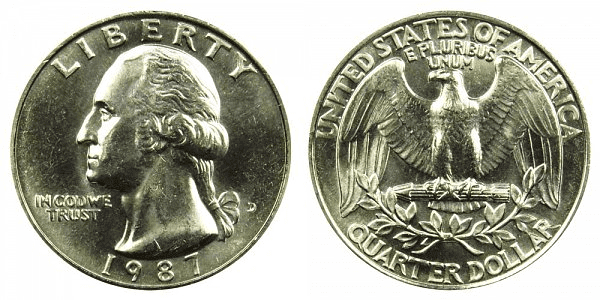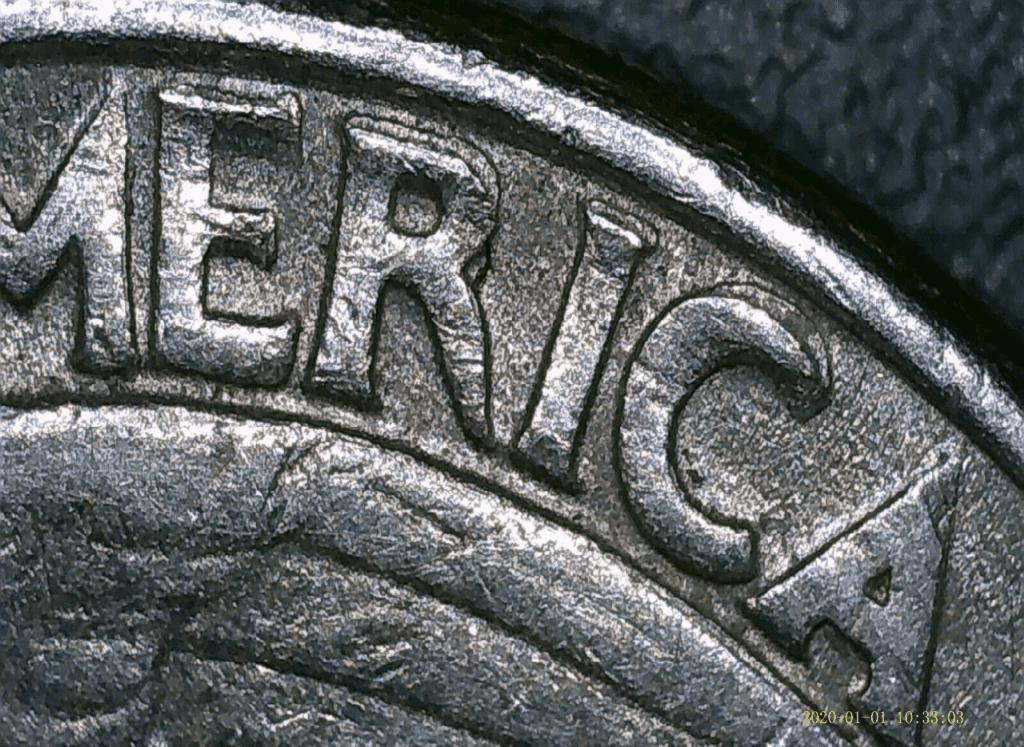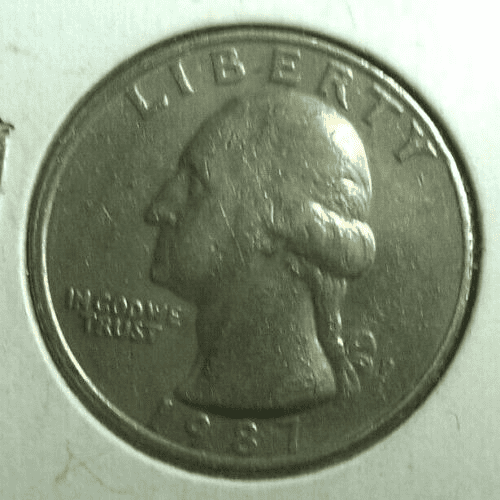What Is the 1987 Quarter Made Of?
The 1987 Washington quarter 8.33% Nickel and 91.67% Copper. With a face value of 25 cents, the 1987 quarter weighs 5.67 grams. It has a diameter of 24.3 mm and a reeded edge.

photo source: Coin HelpU
When it comes to the obverse design of the coin, the 1987 quarter features the left-facing image of George Washington, the first president of the United States. John Flanagan, an American sculptor, designed the Washington quarter coin. There are also inscriptions that you will find on the obverse side. These are the following:
- LIBERTY
- IN GOD WE TRUST
- 1987
- Mint mark (if present)
On the reverse side, you’ll find the bald eagle proudly spreading its wings. The eagle represents the strength, courage, and power of the United States. On top of the head of the eagle is the US motto, E PLURIBUS UNUM, which means out of many one. It expresses the desire of the country to stay united even in the darkest hours.
The eagle is perched on a bundle of arrows, which signifies the readiness of the United States to defend its country. Under the arrow are olive branches that represent peace and tranquility.
Other inscriptions include the following:
- UNITED STATES OF AMERICA
- QUARTER DOLLAR
George Washington wasn’t always on the quarter coin. In fact, when the idea came out to add him, staff members initially planned to make him appear on the half-dollar coin.
Before George Washington came to the quarter coin, the 25-cent had different designs. There’s the Draped Bust, Capped Bust, Seated Liberty, Barber, Isabella quarter, and Standing Liberty, just to name a few.
The 25-cent coin was first struck in 1796. So, it’s not surprising that it has already received a lot of designs. It was only in 1932 that George Washington was added to the quarter coin.
1987 Quarter Varieties
The 1987 quarter comes in different varieties and they differ mainly based on their mint marks, which can be D, S, or P. Other 1987 quarter varieties came into being after some errors happened in the minting process.
Here are some of the important 1987 Washington quarter varieties you should know:
1987 D Quarter Dollar
Year of minting: 1987
Mint Mark: D
Place of minting: Denver
Quantity produced: 655,594,696
Face Value: $0.25 (twenty-five cent)
Price: $0.30 to $6.65 (or more)
Mass: 5.67 grams
Edge: Reeded
Designer: John Flanagan
Composition: 91.67% Copper and 8.33% Nickel
Diameter: 24.3 millimeters
Thickness: 1.75 millimeters

photo source: USA Coin Book
The 1987 D Washington quarter was struck in the Denver Mint. With more than 655 million coins, the D quarter is the most abundantly produced variety of the 1987 quarter coin series.
You can sell this coin for $0.30 to $6.65. However, the open market offers a higher price for pristine and rare 1987 quarter coins.
1987 P Washington Quarter
Year of minting: 1987
Mint Mark: P
Place of minting: Philadelphia
Quantity produced: 582,499,481
Face Value: $0.25 (twenty-five cent)
Price: $0.25 to $10.00 (or more)
Mass: 5.67 grams
Edge: Reeded
Designer: John Flanagan
Composition: 91.67% Copper and 8.33% Nickel
Diameter: 24.3 millimeters
Thickness: 1.75 millimeters

photo source: USA Coin Book
The usual selling price of the 1987 P Washington quarter is between $0.30 to $10.00. This coin was struck in the Philadelphia Mint and there are about 582 million of 1987 P Washington quarter coins produced.
1987 S Washington Quarter
Year of minting: 1987
Mint Mark: S
Place of minting: San Francisco
Quantity produced: 582,499,481
Face Value: $0.25 (twenty-five cent)
Price: $0.25 to $4.52 (or more)
Mass: 5.67 grams
Edge: Reeded
Designer: John Flanagan
Composition: 91.67% Copper and 8.33% Nickel
Diameter: 24.3 millimeters
Thickness: 1.75 millimeters

photo source: USA Coin Book
The S variety is considered to be the coin with the most eye appeal. The reason is that the San Francisco Mint is specialized in producing proof coins that look more beautiful, detailed, and shinier. That’s the reason that only over four million 1987 S Washington quarter coins were made.
You can sell a 1987 S Washington Quarter for $0.30 to $4.52. You can sell it for more provided that your coin is still in good condition with no scratches or if there are, it should only be minor and unnoticeable.
List of Quarter Dollar Errors
There are times when the minting process doesn’t go according to plan. As a result, there were 1987 quarter coins that came out with errors.
Some common errors that happen include die breaks, clashed dies, misaligned dies, mules, broad strikes, off-center strikes, and rotated dies.
Here are some of the examples of 1987 quarter errors:
1987-D Washington Quarter DDR Error Coin

photo source: eBay
DDR means doubled die in reverse. This error produces a doubling of some elements on the coin. For example, in the photo above, there’s a doubling on the edge of the letters E, R, I, and C of the word America.
1987 P Washington clad quarter dollar error: misaligned die

photo source: eBay
The clad wasn’t added properly. There’s a doubling on the rim. The misaligned die caused the coin to be off-center as well.
1987 P Washington Quarter Error Die Clash

photo source: eBay
In this error, the reverse and obverse dies struck each other without a planchet. This caused the dies to get damaged over time. As a result, you’ll see some unusual lines that look like cracks.
How Much Is the 1987 Quarter Worth Today?
The 1987 quarter has a face value of $0.25 cents. If you have a 1987 quarter in a regular strike and circulated condition, it won’t sell that much.
Most quarters might just be around $0.25 to $1.00. Moreover, the 1987 quarter coin’s melt value is also not that high, which sits at around $0.0497.
Nevertheless, there are still 1987 quarter coins that are worth more. Here’s a table to show you their pricing:
| Coin | Condition | Grade | Mintage | Value |
| 1987 D Washington Quarter | Circulated/mint | Not graded | 655,594,696 | $0.30 to $6.65 |
| 1987 P Washington Quarter | Circulated/mint | Not graded | 582,499,481 | $0.25 to $10.00 |
| 1987 S Washington Quarter | Circulated/proof | Not graded | 4,227,728 | $0.25 to $4.52 |
| 1987 D Washington Quarter | Uncirculated/mint | MS-66 | 655,594,696 | $30 |
| 1987 P Washington Quarter | Uncirculated/mint | MS-66 | 582,499,481 | $60 |
| 1987 S Washington Quarter | Uncirculated/proof | PR-69 | 3,262,948 | $18.75 |
| 1987 D Washington Quarter | Uncirculated/mint | MS-67 | 655,594,696 | $420 |
| 1987 P Washington Quarter | Uncirculated/mint | MS-67 | 582,499,481 | $135 |
| 1987 S Washington Quarter | Uncirculated/proof | PR-70 | 3,262,948 | $85 |
How Does The Grading System Work?
The Sheldon Scale is used by numismatists to provide a numerical value to coins. The Sheldon Scale goes from poor (P-1) to perfect mint state (P-1) (MS-70). Coins were originally evaluated using words to reflect their condition (Good, Fair, Excellent, Etc.). Unfortunately, coin collectors and dealers had different ideas about what each of these terms represent.
Professional numismatists joined together in the 1970s and established CoinGrading standards. These numismatists now assign grades at key places on the seventy-point scale, using the most regularly utilized numeric points in conjunction with the original adjective grade. The following are the most common coin grades:
-
-
- (P-1) Poor – Indistinguishable and probably damaged; if used, must have a date and mintmark; otherwise, rather battered.
- (FR-2) Fair – Nearly smooth, but without the damage that a coin graded Poor often possesses. The coin must have enough detail to be identified.
- (G-4) Fair – Inscriptions have merged into the rims in some areas, and important elements have been mostly erased.
- (VG-8) Very Good- A little weathered, but all of the primary design elements are visible, albeit faintly. There is little if any, central detail left.
- (F-12) Good – The item is very worn, yet the wear is even, and the overall design details stand out clearly. Rims are almost completely isolated from the field.
- (VF-20) Very Fine – Moderately weathered, with some finer features still visible. The motto or all letters of LIBERTY are readable. Both sides of the coin have entire rims that are separated from the field.
- (EF-40) Extremely Fine – Gently used; all gadgets are visible, and the most important ones are bold. The finer details are bold and clear, however, light wear may be seen.
- (AU-50) Uncirculated – Slight evidence of wear on the coin’s design’s high points; may have contact marks; eye appeal should be adequate.
- (AU-58) Uncirculated Choice – Slight traces of wear, no severe contact marks, almost full mint shine, and great eye appeal.
- (MS-60) Mint State Basal – Strictly uncirculated; no indication of wear on the coin’s highest points, but an unsightly coin with reduced luster, visible contact marks, hairlines, and other flaws.
- (MS-63) Mint State Acceptable – Uncirculated, but with contact scratches and nicks, little reduced shine, but otherwise appealing appearance. The strike is weak to average.
- (MS-65) Mint State Choice – Uncirculated with great mint shine, very little contact blemishes, and exceptional eye appeal. The strike is unusually severe.
- (MS-68) Mint State Premium Quality – Uncirculated with superb luster, no obvious contact marks to the naked eye, and exceptional eye appeal. The strike is quick and appealing.
- (MS-69) Almost Perfect Mint State – Uncirculated with perfect brilliance, a sharp and appealing strike, and extremely good eye appeal. A near-perfect coin with minor imperfections in the planchet, strike, and contact markings (seen only under 8x magnification).
- (MS-70) Mint State Perfect – Under 8x magnification, there are no tiny imperfections discernible; the strike is crisp, and the coin is perfectly centered on a beautiful planchet. Rarely seen on a coin, this coin is bright and whole, with original luster and exceptional eye appeal.
-
Where to Buy or Sell 1987 Quarter?
There are many places where you can buy or sell 1987 quarters. The quickest way to get started is online. You can do a quick Google search and you should easily find websites that allow you to buy or sell 1987 quarter coins.
You can also go directly to online marketplaces such as Amazon, Etsy, Facebook Marketplace, and eBay.
Aside from online, other places include the United States Mint. You can visit their office and you’ll find they are also selling coins. The websites and offices of coin grading service providers also offer 1987 coins.
Coin shops, antique shops, and auction houses could be among the best places to buy and sell 1987 quarter coins.
FAQs
What 80s quarters are worth money?
There are 1980s quarters that are worth a lot of money. Most of these are rare ones that have survived all throughout the years. According to researchers, the rarest would be the 1983-P Washington quarter. Others include the 1983-D, 1982-P, and 1982-D quarters.
Which quarter says In God We Rust?
In 2005, there was a Kansas quarter that had an error. Due to the coin being struck through grease, the letter “T” in the word “Trust” wasn’t completely engraved. As a result, the wording read, “IN GOD WE RUST.”
Is a 1987 penny copper?
Yes, 1987 pennies are made of copper. However, the 1987 penny is just coated with 2.5% copper with a core metal of 97.5% zinc. Prior to 1982, pennies were made of 95% copper.
1988 Washington Quarter Value Guide (Incld. Rare Varieties)
1989 Jefferson Nickel Value Guide (Incld. Rare Varieties)
1989 Washington Quarter Value Guide (Incld. Rare Varieties)
1977 Penny Value Guide
1977 Kennedy Half Dollar Value Guide







